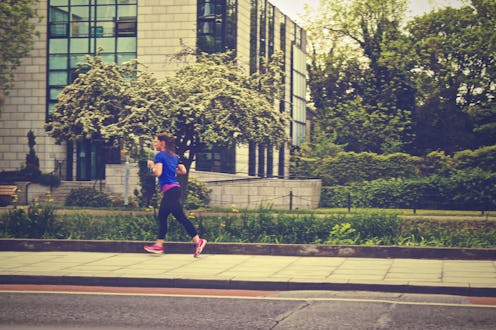Life
Should You Eat After Working Out?

Exercise and nutrition is a tricky business; we're constantly being fed conflicting information concerning our bodies, and if you're anything like me, you've probably been confused about what to do when it comes to your post-workout snacks, too. So: should you eat after working out? It's a topic you've probably read at least a little about — especially if you exercise in the evenings and therefore don't have much time to prepare a full meal afterwards, or if, like me, you're prone to losing your appetite post-workout and don't think much of skipping that final meal of the day.
Well, a recent study by New Zealand's University of Otago of 109 women athletes may have you thinking otherwise. The study's results suggest that not increasing your food intake when exercising can cause some damage to your body. In fact, 44 percent of the surveyed athletes were found to be in a state of Low Energy Availability (LEA) after working out on depleted energy levels and not eating enough later.
This sounds worrying, indeed; after all, no one wants to sustain injuries whilst working out. But before you stock up on the energy bars, remember that there's also a decent amount of research which has debunked this theory completely, too, the most ground-breaking of which came out in 2013. A comprehensive study published in the Journal of the International Society of Sports Nutrition reviewed nutrition literature on eating post-exercise and concluded that actually, all that food post-workout isn't necessary for the average person.
The 2013 study explained that although many of us are told that intense workouts result in the depletion of important stored fuels, such as glycogen and amino acids — something which does, in fact, happen — "nutrient-timing" is only of concern for those who exercise a lot. "Nutrient-timing" is the act of consuming the proper amount of nutrients, usually two hours after exercise, in order to re-build this muscle and fuel.
But after examining this long-held mantra, the study authors found that the need to follow nutrient-timing guidelines only applies to those who exercised again within within eight hours. For those who trained only once per day, glycogen recovery happened on its own over the course of many hours. As sports site Breaking Muscle commented, "Starting the process with a post-workout meal seemed to be irrelevant, as long as total caloric needs were met during the next 24 hours. ... Pre-workout nutrition and total caloric intake are equally important factors."
So, basically, unless you're a professional athlete or someone who won't be eating much the following day, you don't need to worry too much about "re-fueling" your body immediately after working out; it's adept at doing this on its own. Also on Breaking Muscle, coach Peter Curcio expanded on this point, writing, "The immediacy of the post-workout window is only essential if you're an endurance athlete (and/or are an athlete training several times per day). ... For those of us engaging in more resistance-based training, it’s most important to make sure that by the end of the day we’ve consumed our total allotted amount of calories, protein, carbs, and fat, rather than worry as much about what exactly we get before and after a workout."
However, some sources do suggest that eating after exercise is essential — but more for promoting the growth of new muscle than for body recovery. Body building site BodyBuilding.com, for example, argues that your body can enter a "muscle-wasting state" when glycogen levels are low. Eating post-workout is therefore essential "to refill these stores after your workout and jumpstart the growth process (anabolism)." Training source Complete Human Performance also argues that training on low calories and failing to replenish soon after has a negative effect on muscle growth.
Although there's a lot of contrasting info out there, it seems that when it comes to eating post-workout, it's only incredibly important depending on what you're looking to achieve, how often you exercise, how well-fueled your body was before working out, and how well it will be replenished in the 24 hours following exercise.
Luckily, one thing that most nutrition experts are in agreement on is that if you choose to eat post-workout, a balanced mixture of complex carbs, fats, and protein are touted as some of the best options out there. Bring on the Greek yogurt parfait!